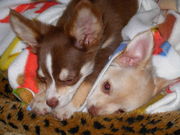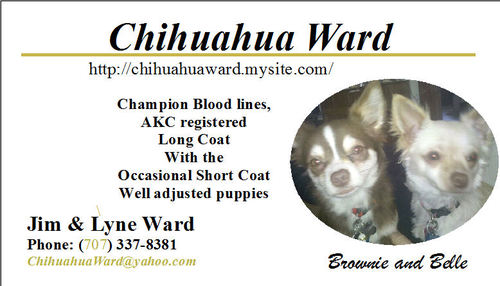Brownie and Belle's Homepage
Chihuahua Information
Be sure to check out the information below on Chihuahua Facts.....
Big News.. Belle came in heat Sept 3rd.. We are hoping we have puppies on the way.. They should be here around November 4th or so.. They need 8 - 10 weeks to grow before they are ready to go home.. It should be around December 30th 2010 or January 1 of 2011..
Be sure to email us to be put on a list.. give name phone number and girl/boy/ long coat, short coat, if there is a color prefrence..
Thanks again for reading our site..
B and B
Our Card is located at the bottom of the page!
Our other Website ... http://chihuahuaward.mysite.com/index.html
Some things to consider
Chihuahua facts
Coach Lane's Gem "Brownie Button" and Cheree Howe's "Belle of the Ball"
Here are some of our favorite websites.... ![]()
I heard they are not good with kids.
How is there health?
Although reverse sneezing may appear to be scary, it only lasts a short time and can be ended by massaging the dog's neck and throat and encouraging the dog to swallow or lick. Another way to slow the reverse sneeze is to clap your hands to distract the dog, or pinch closed the dog's nostrils with your fingers, forcing it to breathe through its mouths and to swallow.
Because Chihuahuas are so small, they can be prone to hypoglycemia, especially when they are very young. Hypoglycemia is usually caused by stress, illness, lack of food, or by using up stored energy without it being replenished.
It is important to make sure that young puppies and very tiny Chihuahuas eat regularly throughout the day. Another preventative for hypoglycemia is regular feeding of a high-calorie supplement called Nutrical, available from your veterinarian or your local pet store.
If you suspect that your Chihuahua is hypoglycemic, call your vet AT ONCE as this condition can be quickly fatal.
Chihuahuas are a lot like little kids. They are wonderful if raised right and absolute brats if they are mistreated or undisciplined. We have5 grandchildren (They all come to visit often) we have 1 4year old.. The most important thing about raising a Chihuahua is making sure it has good experiences with children. have your kids sit when they handle the puppy. That way there is no fear of falling. Have your kids give the puppy tiny treats several times a day, for no reason. The puppy will look forward to seeing the kids! Discipline is just as important. NEVER EVER hit your puppy, but place them in a "time out” simply scoop him or her up, say a firm "no" and put her down away from you and walk away. She will follow you, looking for your approval, find her doing something good (just being quiet is enough) and praise her. She will get the idea quickly! Also another big problem with small dogs is "yapping" don’t ever pick her up when she is barking (including when she is crated) when she is out of the crate and barking use the "time out". If she is in the crate and barking ignore it until she is quiet, then pick her up and praise her.
The official A.K.C. Breed Standard describes the Chihuahua as a small dog that comes in two varieties or coat types. The difference in coat type (the Long Coat or the Smooth Coat) is the only official description used to identify a difference within this breed. So it’s just personal preference.
I want a "tea cup"
For the purpose of showing and record keeping; the American Kennel Club includes the Chihuahua (along with 16 other breeds) in the Toy Group. Therefore, irrespective of their weight or physical stature, ALL Chihuahuas registered with A.K.C. are considered to be a toy breed of dog.
As with all living things, there will be a size variance between individual dogs within this breed. Within the human family, brothers and sisters will differ in height and in weight, as well as other physical attributes. They are described as humans, male or female, and there is seldom if ever a need to break the description down further. The same holds true in regard to the Chihuahua; they are Chihuahuas-Long Coat/Smooth Coat, Male/Female.
Unfortunately, the additional adjectives used to describe the size difference and physical appearances are many; and have been misused for so long they now seem legitimate. Tea-cup, Pocket Size, Tiny Toy, Miniature or Standard - are just a few of the many tags and labels that have been attached to this breed over the years. The Chihuahua Club of America is concerned that these terms may be used to entice perspective buyers into thinking that puppies described in this way are of greater monetary value. They are not; and the use of these terms is incorrect and misleading.
Occasionally, within a litter, there may be a puppy that is unusually small. That puppy is a small Chihuahua and any other breakdown in description is not correct. To attach any of these additional labels to a particular pup is to misrepresent that animal as something that is rare or exceptional and causes a great deal of confusion among those fanciers who are looking for a Chihuahua.
The Chihuahua Club of America does not endorse or condone the use of any of these terms and would caution the perspective puppy buyer not to be misled by them.
We recognize that many Chihuahua fanciers do want the very small puppy. While they are adorable and can be perfectly healthy, the buyer should be cautioned as to the extra care that may be required with regard. the tiniest Chihuahuas can be prone to health issues that the larger 4pound and up Chihuahuas do not suffer from. Also remember these problems are costly in terms of vet bills, but also costly to your heart. these tiny pups don’t usually live as long as the larger chi's.
Look at those ears!

